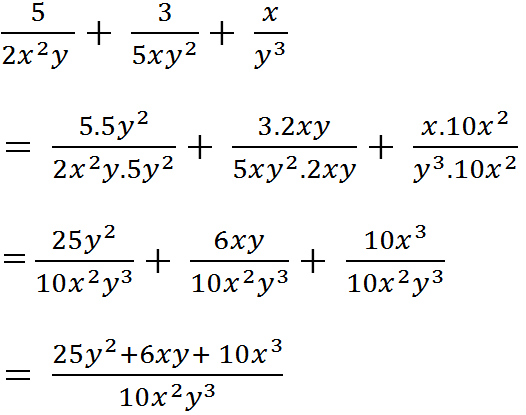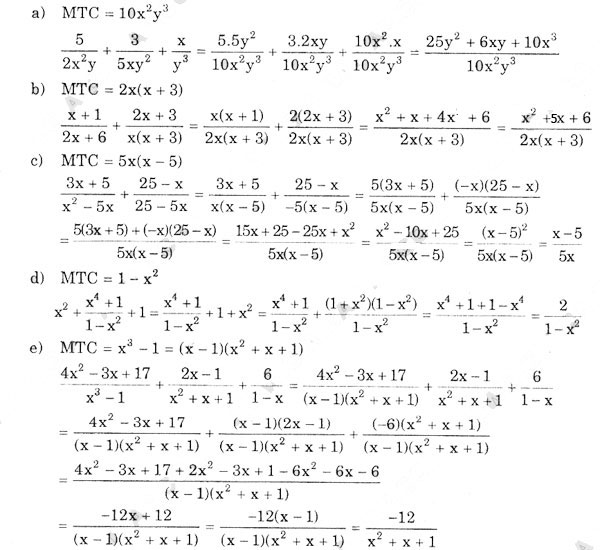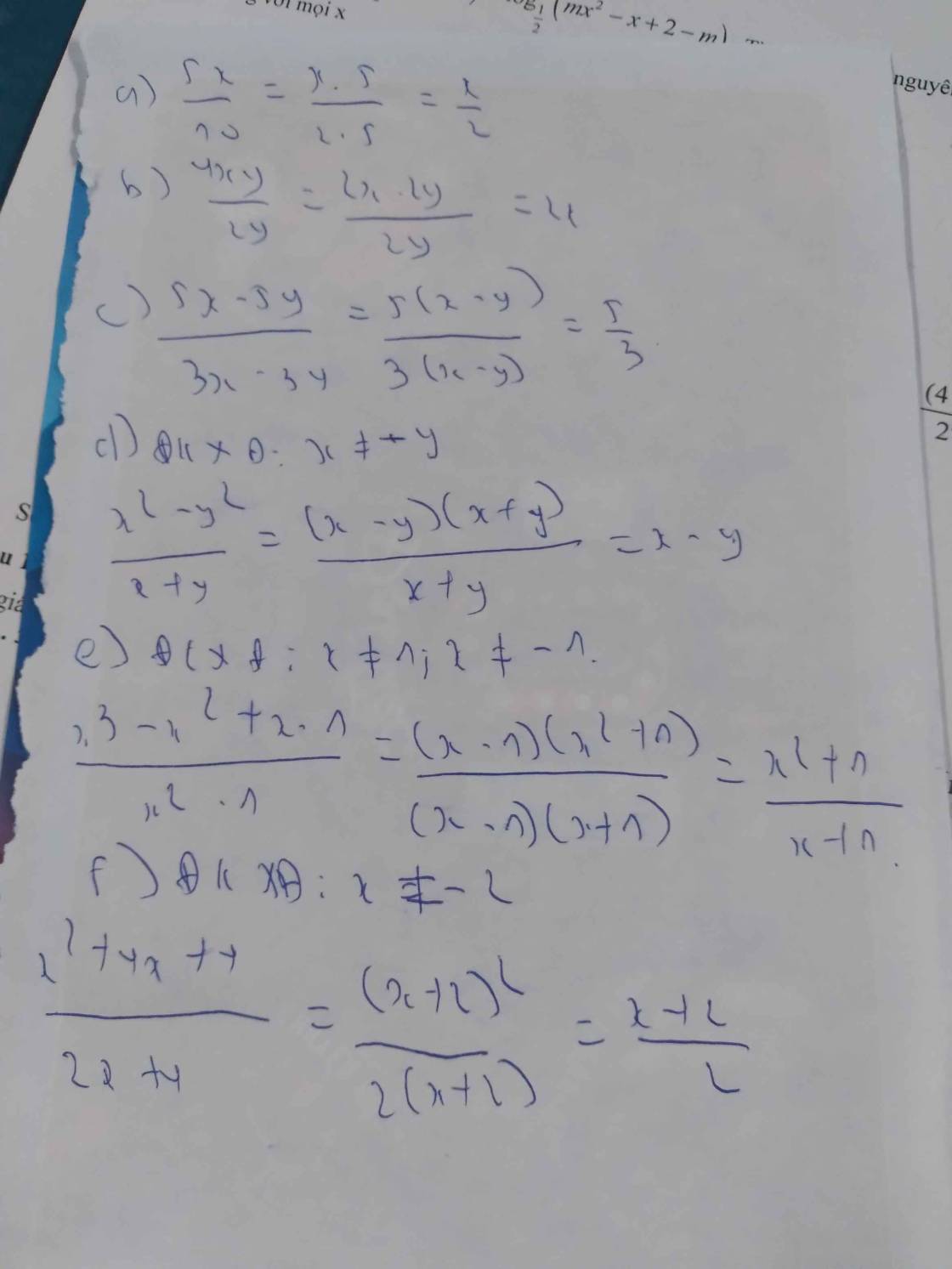Hãy nhập câu hỏi của bạn vào đây, nếu là tài khoản VIP, bạn sẽ được ưu tiên trả lời.

1)
a) Biểu thức \(\dfrac{x-2}{x^2+8x}\) vô nghĩa khi \(x^2+8x=0\)
\(\Leftrightarrow x\left(x+8\right)=0\)
\(\Leftrightarrow\left[{}\begin{matrix}x=0\\x+8=0\end{matrix}\right.\Leftrightarrow\left[{}\begin{matrix}x=0\\x=-8\end{matrix}\right.\)
Vậy: Khi \(x\in\left\{0;-8\right\}\) thì biểu thức \(\dfrac{x-2}{x^2+8x}\) vô nghĩa
b) Biểu thức \(\dfrac{25x^2-1}{16x^2-25}\) vô nghĩa khi \(16x^2-25=0\)
\(\Leftrightarrow\left(4x-5\right)\left(4x+5\right)=0\)
\(\Leftrightarrow\left[{}\begin{matrix}4x-5=0\\4x+5=0\end{matrix}\right.\Leftrightarrow\left[{}\begin{matrix}4x=5\\4x=-5\end{matrix}\right.\Leftrightarrow\left[{}\begin{matrix}x=\dfrac{5}{4}\\x=-\dfrac{5}{4}\end{matrix}\right.\)
Vậy: Khi \(x\in\left\{\dfrac{5}{4};-\dfrac{5}{4}\right\}\) thì biểu thức \(\dfrac{25x^2-1}{16x^2-25}\) vô nghĩa
c) Biểu thức \(\dfrac{x^2+1}{2x^2-28x+98}\) vô nghĩa khi \(2x^2-28x+98=0\)
\(\Leftrightarrow2\left(x^2-14x+49\right)=0\)
\(\Leftrightarrow\left(x-7\right)^2=0\)
\(\Leftrightarrow x-7=0\)
hay x=7
Vậy: Khi x=7 thì biểu thức \(\dfrac{x^2+1}{2x^2-28x+98}\) vô nghĩa
d) Để biểu thức \(\dfrac{2x+3}{9-\left(x+3\right)^2}\) vô nghĩa thì \(9-\left(x+3\right)^2=0\)
\(\Leftrightarrow\left(3-x-3\right)\left(3+x+3\right)=0\)
\(\Leftrightarrow-x\left(x+6\right)=0\)
\(\Leftrightarrow\left[{}\begin{matrix}-x=0\\x+6=0\end{matrix}\right.\Leftrightarrow\left[{}\begin{matrix}x=0\\x=-6\end{matrix}\right.\)
Vậy: Khi \(x\in\left\{0;-6\right\}\) thì biểu thức \(\dfrac{2x+3}{9-\left(x+3\right)^2}\) vô nghĩa
2)
a) ĐKXĐ: \(x\notin\left\{0;-8\right\}\)
b) ĐKXĐ: \(x\notin\left\{\dfrac{5}{4};-\dfrac{5}{4}\right\}\)
c) ĐKXĐ: \(x\ne7\)
d) ĐKXĐ: \(x\notin\left\{0;-6\right\}\)
3)
a) Để phân thức \(\dfrac{x-2}{x^2+8x}=0\) thì x-2=0
hay x=2(nhận)
Vậy: Khi x=2 thì phân thức \(\dfrac{x-2}{x^2+8x}=0\)
b) Để phân thức \(\dfrac{25x^2-1}{16x^2-25}=0\) thì \(25x^2-1=0\)
\(\Leftrightarrow\left(5x-1\right)\left(5x+1\right)=0\)
\(\Leftrightarrow\left[{}\begin{matrix}5x-1=0\\5x+1=0\end{matrix}\right.\Leftrightarrow\left[{}\begin{matrix}5x=1\\5x=-1\end{matrix}\right.\Leftrightarrow\left[{}\begin{matrix}x=\dfrac{1}{5}\left(nhận\right)\\x=-\dfrac{1}{5}\left(nhận\right)\end{matrix}\right.\)
Vậy: Khi \(x\in\left\{\dfrac{1}{5};-\dfrac{1}{5}\right\}\) thì phân thức \(\dfrac{25x^2-1}{16x^2-25}=0\)
c) Để phân thức \(\dfrac{x^2+1}{2x^2-28x+98}=0\) thì \(x^2+1=0\)
mà \(x^2+1>0\forall x\) thỏa mãn ĐKXĐ
nên \(x\in\varnothing\)
Vậy: Không có giá trị nào của x để \(\dfrac{x^2+1}{2x^2-28x+98}=0\)
d) Để phân thức \(\dfrac{2x+3}{9-\left(x+3\right)^2}=0\) thì 2x+3=0
\(\Leftrightarrow2x=-3\)
hay \(x=-\dfrac{3}{2}\)(nhận)
Vậy: Khi \(x=-\dfrac{3}{2}\) thì phân thức \(\dfrac{2x+3}{9-\left(x+3\right)^2}=0\)
mình chỉ làm 1 câu thôi nhé các câu khác làm tương tự
1. biểu thức vô nghĩa <=> mẫu thức = 0
\(x^2+8x=0< =>\left[{}\begin{matrix}x=0\\x=-8\end{matrix}\right.\)
vậy ...
2. tập xác định là tập hợp các giá trị làm phân thức có nghĩa (trong căn thì ≥ 0 ; dưới mẫu thì ≠ 0)
\(x^2+8x\ne0< =>\left[{}\begin{matrix}x\ne0\\x\ne-8\end{matrix}\right.\)
vậy ...
3. để phân thức = 0 => tử bằng không và mẫu khác không
\(\left\{{}\begin{matrix}x-2=0\\x^2+8x\ne0\end{matrix}\right.< =>\left\{{}\begin{matrix}x=2\left(tm\right)\\\left[{}\begin{matrix}x\ne0\\x\ne-8\end{matrix}\right.\end{matrix}\right.\)

Mình nghĩ ra câu C rồi bạn nào giúp mình nghĩ nốt câu A,B hộ mình nhé mình cảm ơn!
a:6x-5-9x^2
=-(9x^2-6x+5)
=-(9x^2-6x+1+4)
=-(3x-1)^2-4<=-4
=>A>=2/-4=-1/2
Dấu = xảy ra khi x=1/3
b: \(B=\dfrac{4x^2-6x+4-1}{2x^2-3x+2}=2-\dfrac{1}{2x^2-3x+2}\)
2x^2-3x+2=2(x^2-3/2x+1)
=2(x^2-2*x*3/4+9/16+7/16)
=2(x-3/4)^2+7/8>=7/8
=>-1/2x^2-3x+2<=-1:7/8=-8/7
=>B<=-8/7+2=6/7
Dâu = xảy ra khi x=3/4

`a,ĐKXĐ:x-4 ne 0,2x+2 ne 0`
`<=>x ne 4,x me -1`
`b,ĐKXĐ:4x^2-25 ne 0`
`<=>(2x-5)(2x+5) ne 0`
`<=>x ne +-5/2`
`c,ĐKXĐ:8x^3+27 ne 0`
`<=>8x^3 ne -27`
`<=>2x ne -3`
`<=>x ne -3/2`
`d,2x+2 ne 0,4y^2-9 ne 0`
`<=>2x ne -2,(2y-3)(2y+3) ne 0`
`<=>x ne -1,y ne +-3/2`
b) ĐKXĐ: \(x\notin\left\{\dfrac{5}{2};-\dfrac{5}{2}\right\}\)
c) ĐKXĐ: \(x\ne-\dfrac{3}{2}\)
d) ĐKXĐ: \(\left\{{}\begin{matrix}x\ne-1\\y\notin\left\{\dfrac{3}{2};-\dfrac{3}{2}\right\}\end{matrix}\right.\)

1.
a) \(x\left(x+4\right)+x+4=0\)
\(\Leftrightarrow\left(x+1\right)\left(x+4\right)=0\)
\(\Leftrightarrow\left[{}\begin{matrix}x+4=0\\x+1=0\end{matrix}\right.\Rightarrow\left[{}\begin{matrix}x=-4\\x=-1\end{matrix}\right.\)
b) \(x\left(x-3\right)+2x-6=0\)
\(\Leftrightarrow\left(x+2\right)\left(x-3\right)=0\)
\(\Leftrightarrow\left[{}\begin{matrix}x+2=0\\x-3=0\end{matrix}\right.\Rightarrow\left[{}\begin{matrix}x=-2\\x=3\end{matrix}\right.\)
Bài 1:
a, \(x\left(x+4\right)+x+4=0\)
\(\Leftrightarrow x\left(x+4\right)+\left(x+4\right)=0\)
\(\Leftrightarrow\left(x+4\right)\left(x+1\right)=0\)
\(\Leftrightarrow\left[{}\begin{matrix}x+4=0\\x+1=0\end{matrix}\right.\Leftrightarrow\left[{}\begin{matrix}x=-4\\x=-1\end{matrix}\right.\)
Vậy \(x=-4\) hoặc \(x=-1\)
b, \(x\left(x-3\right)+2x-6=0\)
\(\Leftrightarrow x\left(x-3\right)+2\left(x-3\right)=0\)
\(\Leftrightarrow\left(x-3\right)\left(x+2\right)=0\)
\(\Leftrightarrow\left[{}\begin{matrix}x-3=0\\x+2=0\end{matrix}\right.\Leftrightarrow\left[{}\begin{matrix}x=3\\x=-2\end{matrix}\right.\)
Vậy \(x=3\) hoặc \(x=-2\)

a: \(=\dfrac{1-2x+3+2y+2y-4}{6x^3y}=\dfrac{-2x+4y}{6x^3y}=\dfrac{-2\left(x-2y\right)}{6x^3y}=\dfrac{-x+2y}{3x^3y}\)
b: \(=\dfrac{x^2-2+2-x}{x\left(x-1\right)^2}=\dfrac{x\left(x-1\right)}{x\left(x-1\right)^2}=\dfrac{1}{x-1}\)
c: \(=\dfrac{3x+1+x^6-3x}{x^2-3x+1}\)
\(=\dfrac{x^6+1}{x^2-3x+1}\)
d: \(=\dfrac{x^2+38x+4+3x^2-4x-2}{2x^2+17x+1}\)
\(=\dfrac{4x^2+34x+2}{2x^2+17x+1}=2\)

\(a,VP=\dfrac{x\left(x+3\right)}{x\left(2x-5\right)}=\dfrac{x+3}{2x-5}=VT\\ b,VP=\dfrac{\left(3-x\right)^2}{\left(3-x\right)\left(3+x\right)}=\dfrac{3-x}{x+3}=VT\\ c,VP=\dfrac{\left(x+4\right)\left(x^2-4x+16\right)}{\left(3-x\right)\left(x^2-4x+16\right)}=\dfrac{x+4}{3-x}=VP\left(bạn.sửa.lại.đề.đi\right)\\ d,VT=\dfrac{x^3-2x^2+8x^2-16x+15x-30}{x^3-5x^2+8x^2-40x+15x-75}\\ =\dfrac{\left(x-2\right)\left(x^2+8x+15\right)}{\left(x-5\right)\left(x^2+8x+15\right)}=\dfrac{x-2}{x-5}=VP\)

a) \(\dfrac{5x}{10}=\dfrac{x}{2}\)
b) \(\dfrac{4xy}{2y}=2x\left(y\ne0\right)\)
c) \(\dfrac{5x-5y}{3x-3y}=\dfrac{5}{3}\left(x\ne y\right)\)
d) \(\dfrac{x^2-y^2}{x+y}=x-y\left(đk:x\ne-y\right)\)
e) \(\dfrac{x^3-x^2+x-1}{x^2-1}=\dfrac{x^2+1}{x+1}\left(đk:x\ne\pm1\right)\)
f) \(\dfrac{x^2+4x+4}{2x+4}=\dfrac{x+2}{2}\left(đk:x\ne-2\right)\)





1/
A= \(\dfrac{2x+6}{\left(x+3\right)\left(x-2\right)}\) = 0 ;(ĐKXĐ : x ≠ -3; x ≠ 2)
⇔ A = \(\dfrac{2\left(x+3\right)}{\left(x+3\right)\left(x-2\right)}\) = 0
⇔ A = \(\dfrac{2}{x-2}\) = 0
⇒ x = 2 (loại) ⇒ pt vô nghiệm
về phân thức bạn .